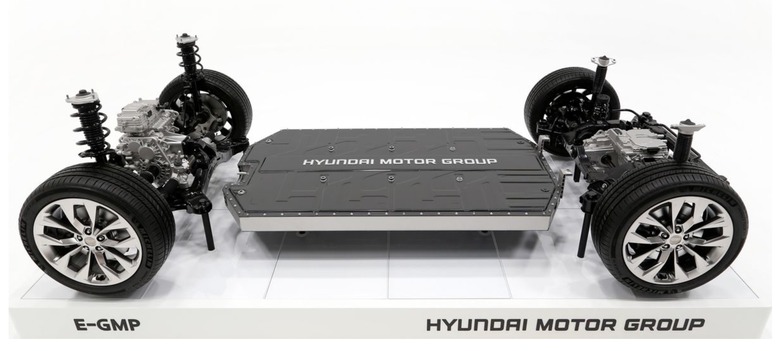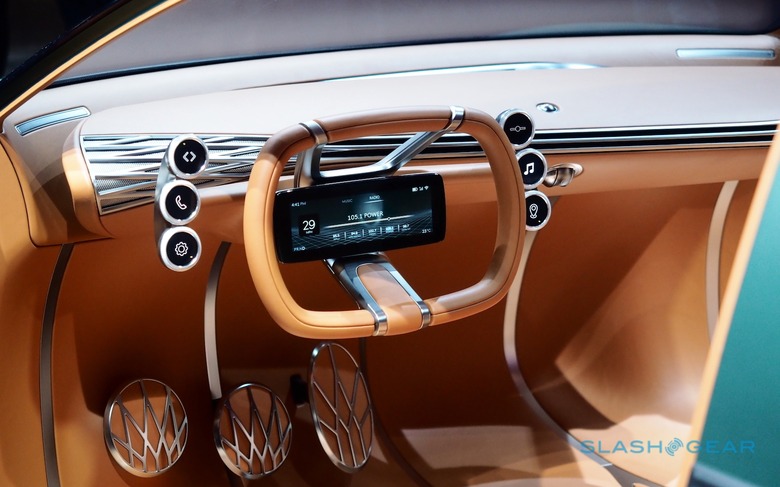Apple Car Potential Specs Emerge As Analyst Boosts The Biggest EV Rumors
The long-standing rumors of an Apple car keep gaining traction, with the Cupertino firm's supposed collaboration with Hyundai helping add some potential specifications to the upcoming electric vehicle. The subject of speculation and leaks for several years now, Apple's car project – known as "Project Titan" internally – got more serious in early January, when Hyundai seemingly confirmed that the two companies were in talks about a partnership.
Exactly what Apple has had in mind to build has been the focus of most rumors since the idea of an Apple car first broke cover. The earliest speculation suggested autonomous driving was the primary goal; subsequent leaks, along with changes to the Project Titan team, hinted that those ambitions had been scaled back somewhat, with Apple instead wanting to get into the potentially lucrative Advanced Driver Assistance System (ADAS) provider space.
That would see it sell its technologies to other automakers for inclusion, much in the way that Bosch and MobilEye do today with features like adaptive cruise control and lane-keeping assistance. However chatter that a full Apple electric vehicle was back on the roadmap soon followed. In January, Hyundai sources suggested Apple was in discussions with a number of automakers.

Now, in a note to investors, well-respected analyst Ming-Chi Kuo has added some details of his own. He claims to have not only corroborated the Apple-Hyundai talks, AppleInsider reports, but that the first Apple car model will be built on Hyundai's E-GMP platform. That's the specialized architecture that the automaker developed for electric vehicles.
Both Hyundai and Kia will use E-GMP – which is short for "Electric-Global Modular Platform" – for EVs of their own this year, along with Genesis, Hyundai's luxury arm. Announced late in 2019, the platform is designed with flexibility in mind: it can be outfitted for front-wheel drive, rear-wheel drive, or all-wheel drive configurations. E-GMP relies on a single package containing an electric motor, a new EV transmission, and an inverter.
The battery pack is mounted in-between the axles, underneath the cabin, and is designed to support both 400V and 800V capabilities. That opens the door to broader charger support; indeed, Hyundai has said that it could recharge from zero to 80-percent in as little as 18 minutes, with the right power supply. It could also support bi-directional charging, where the vehicle's battery can be used as effectively a huge power pack, useful in the case of utility outages.
A full charge, Hyundai has said, could be sufficient for more than 310 miles of driving. That, albeit, is on the WLTP test cycle, rather than the typically-stricter US EPA cycle. For those times where profligacy is the preference, 0-60 mph could come in under 3.5 seconds, Hyundai says, depending on vehicle configuration, with a limited top speed of up to 160 mph.
According to Kuo, the Hyundai deal isn't the only one Apple might be chasing. The electronics company is also in talks with European automaker behemoth PSA, which has recently merged with Fiat Chrysler Automobiles and formed Stellantis, as well as with General Motors. It's unclear just how those deals would work in tandem, though Kuo suggests the strategy in mind is to tap those automakers' production capabilities for a shortcut to market.

"Apple's deep collaboration with current automakers (Hyundai Group, GM, and PSA) who have extensive development, production, and qualification experience will significantly shorten the Apple Car development time and create a time-to-market advantage," Kuo suggests in the note. "We believe that Apple will leverage current automakers' resources and focus on self-driving hardware and software, semiconductors, battery-related technologies, form factor and internal space designs, innovative user experience, and the integration with Apple's existing ecosystem."
All the same, the analyst doesn't expect an Apple car to reach the market until 2025, and even then that's an ambitious roadmap. Other estimates have been several years later than that – including from Kuo himself – a reflection of the degree of challenge any company faces when they try to break into the automotive segment.
The first example of the Apple car is expected to fit into a premium position. However the goal is to tap economies of scale at traditional automakers along with Apple's tech and ecosystem – along with the significant battery developments it's said to have made – to broaden the line-up. That may echo the Apple Watch model, where Apple has multiple variants of the smartwatch including the short-lived Apple Watch Edition with a more premium casing – and the biggest price tag.
